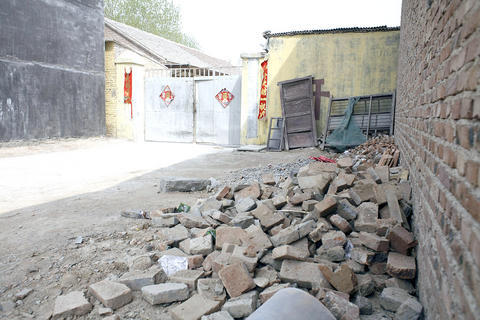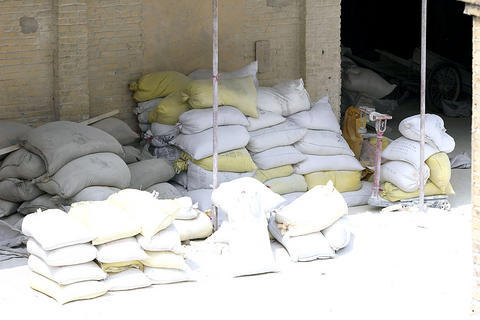A Chinese company accused of selling contaminated wheat gluten to US pet food suppliers avoided inspections partly because it did not correctly disclose its shipping contents to Chinese export authorities, according to US regulators.
The Xuzhou Anying Biologic Technology Development Co, one of two Chinese companies at the center of the huge recall of pet food that has killed or sickened thousands of animals, shipped more than 635 tonnes of wheat gluten labeled as nonfood products this year through a third-party Chinese textile company.
By listing the goods as nonfood items, the firm's shipments were not subject to mandatory inspection by the Chinese government.

PHOTO: NY TIMES NEWS SERVICE
Though a possible violation of Beijing's export policies, such mislabeling is thought to be widespread in China.
The details of the case, some of them disclosed on Friday in a circular released by the US Food and Drug Administration (FDA), are just the latest clues that Chinese feed suppliers may have been intentionally disguising the contents of their goods.
Several FDA officials are now visiting China to seek more information about how and why an industrial chemical used in plastics and fertilizer got mixed into pet food ingredients.

PHOTO: NY TIMES NEWS SERVICE
US regulators admit that six weeks after one of the biggest pet food recalls in US history, they still do not know exactly who in China manufactured the contaminated pet food ingredients or where in China the contamination took place.
Though the agency has named two Chinese companies as the suppliers of the tainted vegetable protein sent to the US, regulators suspect the companies may not have been manufacturing the feed, but buying it from dozens of other feed manufacturers in China.
Those feed producers, regulators say they believe, may have intentionally mixed melamine into the feed to inflate artificially the level of protein in the bags to meet pet food requirements.
The two Chinese companies named by US regulators last month have said little publicly since the recall.
Both companies are based in eastern China, near one of the country's biggest wheat-growing regions and also one of the centers of melamine production.
Melamine is an industrial chemical that animal feed producers here say has been intentionally mixed into feed to trick farmers into thinking they are buying higher protein meal, even though the chemical has no nutritional value.
The Chinese government said last week that it was unlikely melamine could have harmed so many pets in the US.
But on Friday, China banned melamine from use in any vegetable protein for export or for use in the domestic food market.
The FDA says that it has received reports that more than 4,000 cats and dogs died as a result of eating pet food that may have been laced with melamine.
Scientists are now struggling to determine why melamine, a chemical that is not believed to be toxic, may have turned poisonous.

FREEDOM OF NAVIGATION: The UK would continue to reinforce ties with Taiwan ‘in a wide range of areas’ as a part of a ‘strong unofficial relationship,’ a paper said The UK plans to conduct more freedom of navigation operations in the Taiwan Strait and the South China Sea, British Secretary of State for Foreign, Commonwealth and Development Affairs David Lammy told the British House of Commons on Tuesday. British Member of Parliament Desmond Swayne said that the Royal Navy’s HMS Spey had passed through the Taiwan Strait “in pursuit of vital international freedom of navigation in the South China Sea.” Swayne asked Lammy whether he agreed that it was “proper and lawful” to do so, and if the UK would continue to carry out similar operations. Lammy replied “yes” to both questions. The

Two US House of Representatives committees yesterday condemned China’s attempt to orchestrate a crash involving Vice President Hsiao Bi-khim’s (蕭美琴) car when she visited the Czech Republic last year as vice president-elect. Czech local media in March last year reported that a Chinese diplomat had run a red light while following Hsiao’s car from the airport, and Czech intelligence last week told local media that Chinese diplomats and agents had also planned to stage a demonstrative car collision. Hsiao on Saturday shared a Reuters news report on the incident through her account on social media platform X and wrote: “I

SHIFT PRIORITIES: The US should first help Taiwan respond to actions China is already taking, instead of focusing too heavily on deterring a large-scale invasion, an expert said US Air Force leaders on Thursday voiced concerns about the Chinese People’s Liberation Army’s (PLA) missile capabilities and its development of a “kill web,” and said that the US Department of Defense’s budget request for next year prioritizes bolstering defenses in the Indo-Pacific region due to the increasing threat posed by China. US experts said that a full-scale Chinese invasion of Taiwan is risky and unlikely, with Beijing more likely to pursue coercive tactics such as political warfare or blockades to achieve its goals. Senior air force and US Space Force leaders, including US Secretary of the Air Force Troy Meink and

‘BUILDING PARTNERSHIPS’: The US military’s aim is to continue to make any potential Chinese invasion more difficult than it already is, US General Ronald Clark said The likelihood of China invading Taiwan without contest is “very, very small” because the Taiwan Strait is under constant surveillance by multiple countries, a US general has said. General Ronald Clark, commanding officer of US Army Pacific (USARPAC), the US Army’s largest service component command, made the remarks during a dialogue hosted on Friday by Washington-based think tank the Center for Strategic and International Studies. Asked by the event host what the Chinese military has learned from its US counterpart over the years, Clark said that the first lesson is that the skill and will of US service members are “unmatched.” The second